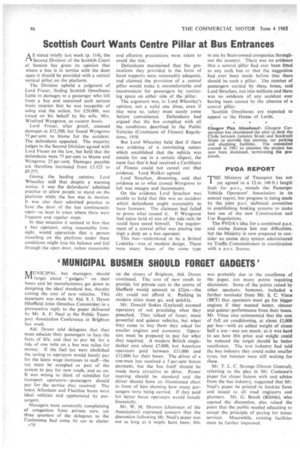MUNICIPAL BUSMEN SHOULD FORGET GADGETS'
Page 48

If you've noticed an error in this article please click here to report it so we can fix it.
N4UNICIPAL bus managers should IVI forget about "gadgets" on their buses and let manufacturers get down to designing the ideal standard bus, thereby cutting the cost of new vehicles. This statement was made by Ald. S. I. Dyson (Sheffield Joint Omnibus Committee) in a provocative reply to the paper delivered by Mr, A. F. Neal at the Public Transport Association Conference in Brighton last week.
Aid. Dyson told delegates that they must educatelheir passengers to face the facts of life, and that to pay 4d. for a ride of one mile on a bus was value for money. If the fuel tax were abolished the saving to operators would barely pay for the latest wage increases to staff—the tax must be accepted as part of the system to pay for new roads, and so on. It was wrong to think of subsidies for transport operators—passengers should pay for the service they received. The latest Atlantean and Fleetline buses were ideal vehicles and appreciated by passengers.
Managers were constantly complaining of congestion from private cars, yet three quarters of the delegates to the Conference had come by car to clutter
c10 up the streets of Brighton, Ald. Dyson continued. The cost of new roads to provide for private cars in the centre of Sheffield would amount to £21m.—the city could not afford it. Parking in modern cities must go, and quickly.
Mr. Donald Stokes (Leyland) accused operators of not practising what they preached. They talked of faster, more powerful and quieter vehicles, but when they came to buy them they asked for smaller engines and economy. Operators must be prepared to pay for what they required. A modern British singledecker cost about £7,000, but American operators paid between £11,000 and £12.000 for their buses. The driver of a one-man bus received a 5 per cent bonus payment, but the bus itself should be made more attractive to drive. Power steering should be standard and the driver should have an illuminated chart in front of him showing how many passengers were being carried. If they paid for better buses operators would benefit financially.
Mr. W. M. Dravers (chairman of the Association) expressed concern that the discussion following Mr. Neal's paper was not as long as it might have been: this
was probably due to the excellence of the paper, not many points requiring discussion. Some of the points raised by other speakers, however, included a further reminder from Mr. S. C. Vince (BET) that operators must go for bigger engines if they wanted better, cleaner and quieter performance from their buses. Mr. Vince also commented that the cost of full air conditioning, at about £1,000 per bus—with an added weight of about half a ton—was too much: as it was hard to see how this price and weight could be reduced the target should be better ventilation. The tyre industry had told the bus industry they could make smaller tyres, but busmen were still waiting for these.
Mr. T. L. C. Strange (Devon General), referring to the plea in Mr. Custance's paper for closer liaison with and advice from the bus industry, suggested that Mr. Neal's paper he printed in booklet form and issued to all road engineers and planners. Mr. G. Brook (Ribble), who opened the discussion, also raised the point that the public needed educating to accept the principle of paying for better services. Meanwhile, existing facilities must be further improved.
























































































































